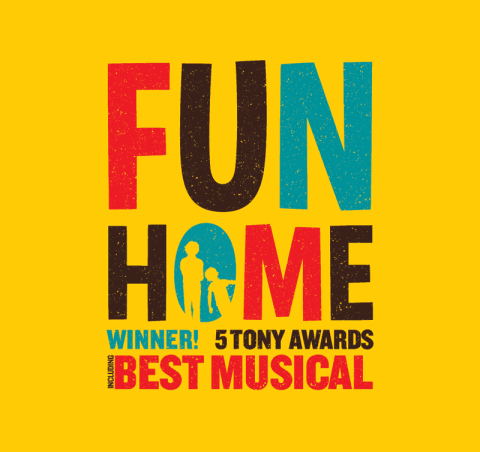The 'Fun Home' Reading List

Throughout Fun Home, onstage through April 1, 2017 at the Ahmanson Theatre, books serve as markers of different stages in graphic memoir author Alison Bechdel’s life. A book from her dad offers a hint that he might know she’s a lesbian; a bookstore is where she realizes she’s gay. In the graphic memoir especially, books are a means for Bechdel to communicate with her intellectual parents, particularly her father—and then an invaluable resource as she comes to terms with her sexuality. To celebrate Fun Home—a seminal LGBT book that celebrates the acts of writing and reading—we’ve put together a reading list comprised of some of the most prominent and important books mentioned in the graphic memoir. Follow us on Instagram and Twitter @CTLGA to join our Fun Home Book Club, where we will dig into some of the books on this list.
'The Catcher in the Rye' by J.D. Salinger

Alison’s father, who is also her high school English teacher, assigns The Catcher in the Rye to his class. Bechdel writes, “Sometimes it was as if Dad and I were the only ones in the [class]room. The sensation of intimacy was novel.” Published in 1951, J.D. Salinger’s preeminent novel remains one of the best English-language works of fiction of all time, a symbol of teen angst, individuality, and the hardship of growing up.
'Remembrance of Things Past' by Marcel Proust

Bechdel’s father began reading Proust’s master work Remembrance of Things Past the year before he died, and Bechdel makes frequent references to Proust throughout the graphic memoir. Bechdel writes, “[Proust] would also fictionalize real people in his life by transposing their gender—the narrator’s lover Albertine, for example, is often read as a portrait of Proust’s beloved chauffeur/secretary, Alfred. My father could not afford a chauffeur/secretary. But he did spring for the occasional yardwork assistant/babysitter. He would cultivate these young men like orchids.”
'Ulysses' by James Joyce

Ulysses is one of those novels owned by just about every liberal arts school graduate, but only read by a select few. Ulysses was also Bechdel’s father’s favorite book. His delight when she takes a course on the novel while in college allows for another moment of intimacy in their relationship—and marks an important day in Bechdel’s life, as the day she signs up for the course, she realizes she is a lesbian.
'Earthly Paradise' by Colette

Known equally for her nonfiction and fiction, Colette is up there with the best French writers of the 20th century. Earthly Paradise is a year-by-year account of the author’s life, which Bechdel’s father gives her after she heads off to college—and signals that he might just understand what she’s going through as she tries to understand her sexuality. Bechdel writes, “Colette could write better than anyone about physical things; they include the feel of a peach in one’s hand. A man could only write in this way about a woman’s breast. One siren lead to another in an intertextual progression. I referred back to Colette herself, basking in her sensualism as perhaps the sea-ravaged Odysseus had in the ministrations of Nausicaa.”
'Word Is Out' by Nancy Adair and Casey Adair

In a pivotal scene in the musical, Alison tells Joan—whom she’s met at a meeting of their college’s Gay Union—that she realized she was gay after flipping through Word Is Out on a bookstore shelf. Written by Nancy and Casey Adair, the book contains interviews of 26 gay Americans. The book creates a domino effect of altering moments in Bechdel’s life—acknowledging her sexuality, falling in love with Joan, and coming out to her parents.
'Rubyfruit Jungle' by Rita Mae Brown

Published in 1973, Rubyfruit Jungle was considered revolutionary for its depiction of a lesbian protagonist. It is also one of the many works of queer literature Bechdel read in college as she comes to terms with her sexuality. She writes of this literary expedition, “If only I’d had the foresight to call this an independent reading. ‘Contemporary and Historical Perspectives on Homosexuality’ would have had quite a legitimate ring.”
'Flying' by Kate Millett

In Flying, sculptor and author Kate Millet looks back on her strict Irish-Catholic, Midwestern upbringing and the discovery of her sexuality. It delves into her bisexuality, her involvement in the women’s movement, and the pressure from that movement when she publicly reveals that she is bisexual. Bechdel writes, “Kate Millet appeared to be a latter-day Colette, with the libertine aristocrats exchanged for conceptual artists and radical feminists. I checked the book out, riveted by the avalanche pace and shameless name-dropping.”
'The Great Gatsby' by F. Scott Fitzgerald

After Bechdel’s mother sends her husband a biography of Fitzgerald while he is in the Army, he begins to devour Fitzgerald’s fiction. Bechdel writes that her father saw himself in various Fitzgerald characters, most prominently the title character of The Great Gatsby. “Gatsby’s self-willed metamorphosis from farm boy to prince is in many ways identical to my father’s. Like Gatsby, my father fueled this transformation with ‘the colossal vitality of his illusion,’” Bechdel writes.
